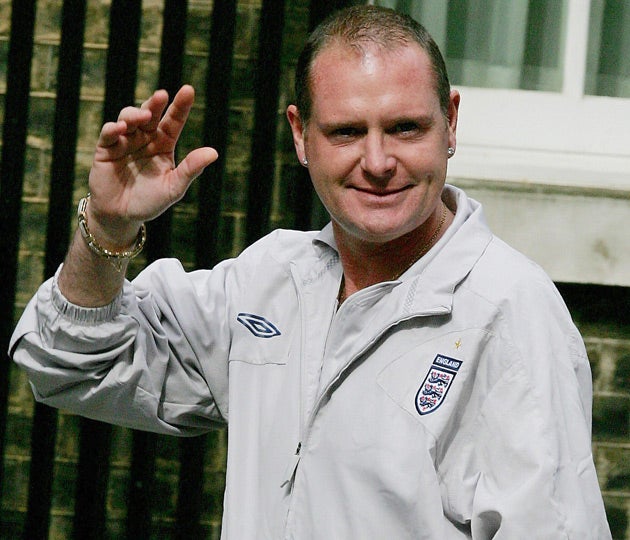Last Night's Television - The Diary of Anne Frank, BBC1; Saving Gazza, Channel 4
They think it's all over

Somewhere last night, a faintly myopic couple doubtless checked the TV listings and sat down to watch Saving Gazza, expecting a documentary about the unfolding catastrophe that is the Middle East, instead finding a documentary about the unfolding catastrophe that is the increasingly precarious life of Paul Gascoigne.
Once the most talented English footballer of his generation, Gascoigne is now a booze-soaked wreck whose erratic mood swings and abusive tantrums appear finally to have alienated the four people most eager to save him from himself: his ex-wife Sheryl and their three children. Saving Gazza turned out to be their story, although it was meant to be his. David Clews and his crew somehow or other got permission to chart Gascoigne's progress after he checked out of the Priory clinic in Roehampton last summer and into Sheryl's house, where the rehabilitation process was supposed to continue, but he scarpered after 12 days, driven partly by fury that Sheryl wouldn't let him into her bed, and the family only learnt his subsequent whereabouts from a gleeful tabloid press.
Gascoigne had joined his heavy-metal friends Iron Maiden on their European tour, an exercise not generally recommended for someone trying to kick his addictions, although not even Iron Maiden, it turned out, could cope with Gazza. The tour manager phoned his mother to express anxiety abut his behaviour, and one can only hope that one day Gascoigne will be sober and clear-headed enough to have a chuckle at the idea of Iron Maiden phoning his mum to say that he wasn't behaving himself. It seems unlikely, alas, that such a day will ever dawn. If the booze doesn't push Gazza into an early grave, the self-hatred probably will.
The impact of all this on his family, meanwhile, is incalculable. Gascoigne raised as his own the two children Sheryl had when he met her, and together they have a 12-year-old son, Regan. The two older children, 22-year-old Bianca and Mason, 19, at least have memories of him as a caring, fun-loving presence in their lives, but Regan knows only the tormented figure who couldn't cope with the waning of his talent, and of the four, despite being the only one with blood ties, is the least sympathetic towards a man whose excesses he described in sometimes alarming detail. The image of a father vomiting into a crisp packet, then digging his hand back in to pull out more crisps, is one that no child should have to carry in his mind. Whether it is one that he should have been encouraged to share with the viewing audience is a trickier matter to judge.
I started watching Saving Gazza (which should perhaps have stuck with its original title, Surviving Gazza) in a fug of sadness. I interviewed Gascoigne towards the end of his playing career but when his life still seemed radiant with possibilities, and it was horrible to see the depths to which he has sunk, depths of paranoia and delusion as well as alcoholism. Compounding this sadness was bemusement that Sheryl and her children should apparently want to advertise their despair, and make uneasy voyeurs of the rest of us. Cynically, I wondered whether they were trying to exploit the dregs of his fame (Bianca, a surgically enhanced so-called glamour model, has already spent the last few years enthusiastically using the Gascoigne name) before it is too late. But by the end my cynicism had wilted. Sheryl emerged with dignity as a long-suffering woman at the end of her tether, and the advice she got from a therapist was worth hearing: that there comes a point at which you can no longer jeopardise your own life to help a loved one bent on self-destruction. "Nobody's ever said to me before that it's OK if I don't help him," said Sheryl, weeping, and in a way it felt like a privilege to be there at the moment of catharsis, if such it was.
It feels like a privilege, too, to read the private musings of Anne Frank, and the poignancy of her story, if not the nature of her predicament, with confinement at its heart, has always made it an obvious candidate for screen adaptation. There have been quite a few efforts down the years, not least the 1959 film based on the Pulitzer Prize-winning play, which got three Oscars but mixed reviews and poor box-office returns.
I have also seen the familiar tale adapted at least twice for television, but never as expertly as The Diary of Anne Frank, wonderfully dramatised by the novelist Deborah Moggach, and quite beautifully acted, in particular by Ellie Kendrick in the title role, and by the ever more splendid Tamsin Greig as Anne's mother, Edith. It is hugely heartening to begin a new year with a reminder that the BBC can still make fantastic, accessible drama, and hats off to the schedulers, too, for daringly running it over five consecutive nights at 7pm. By the end I fully expect to be watching through my fingers: Saving Gazza gave me some useful practice.
Join our commenting forum
Join thought-provoking conversations, follow other Independent readers and see their replies
Comments
Bookmark popover
Removed from bookmarks